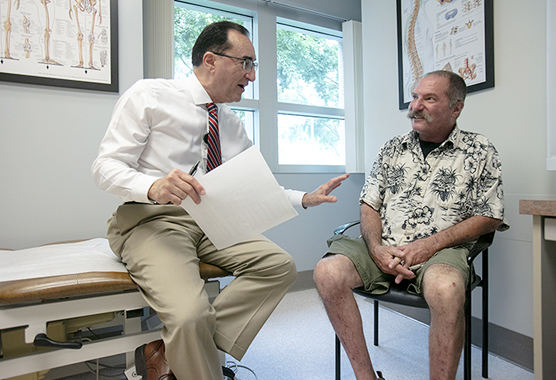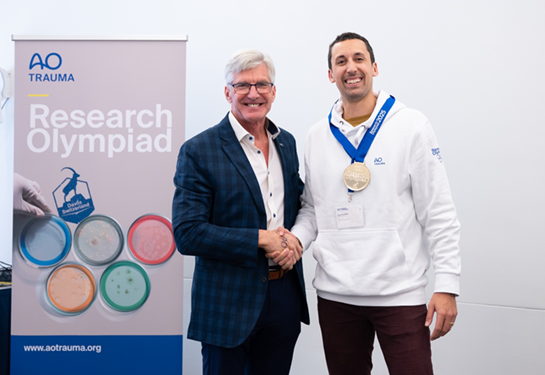Muscular and Soft Tissue Disorders
We offer state-of-the-art diagnosis and treatment of muscular and soft tissue conditions. Our specialists provide comprehensive nonsurgical and surgical care and the support you need.
Medically reviewed on March 26, 2024.

World-Class Care for Muscular and Soft Tissue Disorders
The UC Davis Department of Orthopaedic Surgery is one of the nation’s leading hospitals in caring for patients with muscular and soft tissue disorders. Our world-class providers offer comprehensive diagnosis and treatment options, along with the highest quality of care.
What Are Muscular and Soft Tissue Disorders?
Muscular and soft tissue disorders involve injuries to the tissue surrounding your bones and joints. Soft tissue includes:
- Connective tissue that joins the end of bones (ligaments).
- Fluid-filled sacs (bursae) that cushion your bones and other tissue.
- Muscles.
- Tissue that connects muscles to bone (tendons).
The most common types of muscular and soft tissue disorders include:
- Bruises (contusions): Injuries to your soft tissue by direct force cause contusions. Contusions lead to discoloration around the tissue due to bleeding.
- Bursitis: Bursae can become inflamed suddenly or due to repetitive movement.
- Sprains: Stretched or torn ligaments result in sprains.
- Strains: Stretched or torn muscles or tendons cause strains.
- Tendonitis: Inflamed tendons, sometimes due to repeated movement, lead to tendonitis.
- Tendinosis: A breakdown of protein (collagen) in your tendons, often caused by overuse, can result in tendinosis.
Muscular and Soft Tissue Disorders Symptoms
Symptoms vary depending on the type of muscular and soft tissue disorder.
Common Symptoms
Some common symptoms may include:
- Bruising or swelling
- Difficulty moving your muscle or joint
- Muscle weakness
- Pain or burning
- Stiffness
- Warm, red skin
Emergency Symptoms
Seek care immediately if you experience any of the following symptoms:
- Inability to move the injured area
- Numbness in the injured area
- Severe or worsening bleeding, bruising or swelling
- Signs of infection such as chills, fever or sweating
- Sudden and sharp or worsening pain
Muscular and Soft Tissue Disorders Causes
Muscular and soft tissue disorders can result from a one-time trauma (acute injury) or repeated movement (chronic or overuse injury). The main causes of muscular and soft tissue disorders include:
Blows to the Body
Direct blows that don’t break the skin may cause contusions.
Falls
Falling can lead to a sprain or contusion.
Overuse
Using the same joints or muscles in repetitive movements increases the chance of bursitis, tendonitis or tendinosis.
Diagnosing Muscular and Soft Tissue Disorders
Our experienced providers at UC Davis Health specialize in diagnosing muscular and soft tissue disorders. We first ask you about your symptoms and anything you think may have caused the disorder. Then we do a comprehensive physical examination, focusing on the area of injury.
Your provider may recommend imaging tests, such as a CT scan, MRI, ultrasound, or X-ray, if they suspect a muscular or soft tissue disorder. These tests give us more information about the best way to treat your specific condition.
Muscular and Soft Tissue Disorders Treatments at UC Davis Health
Our orthopaedic specialists provide the highest standard of care for muscular and soft tissue disorders in patients of all ages. We offer a range of nonsurgical and surgical treatments to improve your musculoskeletal health. Treatment options we offer include:
Compression
Applying continuous pressure to the injured area with an ACE bandage or compression stockings can help reduce pressure.
Immobilization
A brace, orthotic shoe, sling or splint can help support the injured area.
Medication
Prescription and non-prescription medications can reduce pain and swelling.
Nonsurgical Treatments
Injections of cortisone or platelet-rich plasma (PRP) can reduce inflammation, lessen pain and encourage healing. These are performed in our Department of Physical Medicine and Rehabilitation.
Physical Therapy
Physical therapy can improve strength and mobility after a soft tissue injury.
Surgery
Surgery can repair tears in your bursa, muscles and tendons.
Preventing Muscular and Soft Tissue Disorders
You can lower your risk of muscular and soft tissue disorders by:
- Adding new activities gradually
- Consuming enough water
- Getting rest when needed
- Replacing your shoes when they wear out
- Stretching your muscles, but never to the point of pain
- Using proper sports gear
- Warming up before activity and cooling down after activity
Request an Appointment
As Sacramento's No. 1 hospital, you'll benefit from unique advantages in primary care and specialty care. This includes prevention, diagnosis and treatment options from experts in 150 specialties.
Referring Physicians
To refer a patient, submit an electronic referral form or call.
800-4-UCDAVIS
Patients
Call to make an appointment.
Consumer Resource Center
800-2-UCDAVIS

Ranked among the nation’s best hospitals
A U.S. News & World Report best hospital in cardiology, heart & vascular surgery, diabetes & endocrinology, ENT, geriatrics, neurology & neurosurgery, and pulmonology & lung surgery.

Ranked among the nation’s best children’s hospitals
U.S. News & World Report ranked UC Davis Children’s Hospital among the best in pediatric nephrology, orthopedics*, and pulmonology & lung surgery. (*Together with Shriners Children’s Northern California)

Ranked Sacramento’s #1 hospital
Ranked Sacramento’s #1 hospital by U.S. News, and high-performing in aortic valve surgery, back surgery (spinal fusion), COPD, colon cancer surgery, diabetes, gynecological cancer surgery, heart arrhythmia, heart failure, kidney failure, leukemia, lymphoma & myeloma, lung cancer surgery, pacemaker implantation, pneumonia, prostate cancer surgery, stroke, TAVR, cancer, orthopedics, gastroenterology & GI surgery, and urology.

The nation’s highest nursing honor
UC Davis Medical Center has received Magnet® recognition, the nation’s highest honor for nursing excellence.

World-class cancer care
One of ~59 U.S. cancer centers designated “comprehensive” by the National Cancer Institute.

A leader in health care equality
For the 13th consecutive year, UC Davis Medical Center has been recognized as an LGBTQ+ Healthcare Equality Leader by the educational arm of America’s largest civil rights organization.

